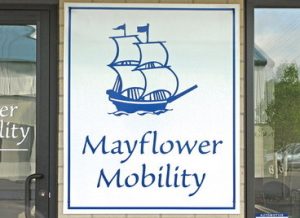Business Management
New Guy in Town
Opening a new signshop inspires a 30-year veteran of corporate America.
Published
15 years agoon
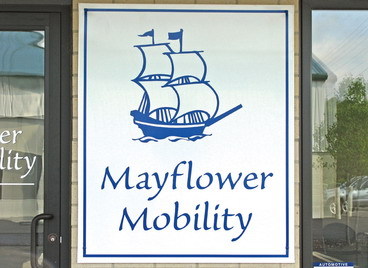
In many “Shop Next Door” columns, ST has profiled signshop owners who’ve tried other career paths before settling on signmaking as their most fulfilling career option. However, it’s quite unusual for that someone to have spent 30 years with Fortune 500 companies. After considerable research, Dan Lundberg took this circuitous route and opened New England Signs and Graphics in Plymouth, MA, last May.
Despite former colleagues’ skepticism, Lundberg’s very satisfied with his new career. Yet, uncertain economic times invariably cause corporate behemoths to trim jobs, and businesses need identities and advertising during any economic climate. Translation: Signage provides a more direct, cost-effective advertising outlet than any mass media. Perhaps many longtime corporate managers might follow Lundberg’s lead and take the entrepreneurial route to the sign industry.
From dough to vinyl
In his former corporate life, Lundberg ascended to executive-level positions in Minnesota with the Pillsbury Co., and in Massachusetts with Dunkin Brands, which operates Dunkin’ Donuts and Baskin-Robbins franchises. At Pillsbury, he managed a broad range of quality and manufacturing operations at both corporate-owned and supplier locations. When Lundberg moved to Dunkin, his quality-management responsibilities entailed developing and managing supplier and store quality- and food-safety standards and production processes.
Though Lundberg’s career was financially rewarding, the desire to be his own boss persuaded him to take a buyout package last year and chart a new course.
Advertisement“My colleagues were probably shocked when I said I was leaving,” Lundberg said. “But, the company’s culture had changed, and my needs had changed as well. I guess you could call it a crossroads.”
After having taken a brief period to decompress and evaluate his professional and personal goals, he noticed a billboard (appropriately enough) that heralded a Business Concept Fair at a nearby hotel. Many fair presenters offered conventional franchising, but Lundberg wanted an enterprise with more independence.
He learned about SignWorld, a royalty-free company that offers a package of startup equipment, and two years of business marketing and operations coaching in exchange for an upfront, $135,000 investment.
“A lot of franchises I looked at revolved around high-volume business,” he said. “I wanted long-term growth potential, but I also wanted to encounter creative challenges. I decided the sign business offered the best combination of both.”
His startup equipment includes a Roland DGA Corporation Versa-CAMM VP-540 printer/cutter, a Graphtec America Inc. Cutting Pro FX 7000 MK2-75 cutting plotter, a Royal Sovereign pressure laminator and Adobe® and SA International FlexiSign® software.
“I didn’t want a piecemeal education about shop and equipment operation, so I jumped headlong into learning the program as quickly as possible,” he said. “The training and equipment I received with my investment helped me open my shop on solid ground.”
AdvertisementLundberg vividly remembers his first order. Mayflower Mobility, a regional chain that offers wheelchairs, stair lifts and other equipment for those with physical challenges, ordered a 2 x 4-ft. building sign.
“We made the sign with AlumaCorr composite material, which we decorated with cut vinyl,” he said. “It was a simple sign, but it was a big deal for me. I felt like I legitimately owned my own sign business.”
Most of New England Signs & Graphics’ inhouse business includes panel signs, medium-sized banners and partial wrap and cut-vinyl vehicle graphics, building-ID signs and similar, vinyl-decorated graphics. Because he operates a small, 1,600-sq.-ft. shop with only a full-time graphic artist and a part-time fabricator, Lundberg partners with several subcontractors.
“I don’t have experience with dimensional signage, electric signs and other complex sign types yet,” he said. “Someday, I’d like to have the knowledge to accommodate those types of orders inhouse, but that’s not our position right now. So, we’re fortunate to have a solid net-work of specialty-sign providers here.”
Conversely, New England Signs & Graphics has also gained work by wholesaling jobs to larger signshops. Lundberg said, “In these cases, it’s usually been a large electric-sign shop that wanted to manage a customer’s entire graphics package, and farmed out vinyl graphics. I’m hoping to gain more of these types of opportunities as well.”
AdvertisementBusiness is business
Thus far, Lundberg hasn’t encountered many surprises since opening his shop – except for the time needed to research and obtain permits. He said, “Being a very historically oriented town, Plymouth’s leaders want to uphold a certain image. Their sign code is 25 pages, and city officials are very strict about size, color, shape and the degree of illumination used.”
However, Lundberg sees plenty of similarities to his past professional experience: “Attentive service and product quality are the hallmarks of any successful business, whether you’re selling bagels, coffee or a sign,” he said. “A customer has expectations, and they want to be confident that you’ll meet them. You have to listen to them and understand their message, and appreciate every project detail.”
Eventually, Lundberg wants to grow his shop to a full-time, four-person staff. His wife and youngest son help out occasionally with bookkeeping or production, but New England Signs & Graphics is Dan’s bailiwick. He wants to have the best medium-size, full-service commercial shop in his area.
To Lundberg, this prosperous future will include a CNC router and a UV printer to accommodate various rigid-media applications. If and when time permits, he also wants to obtain the expertise and the tools to fashion the occasional, handcarved sign. Though he doesn’t foresee LED-lit or other electrical signage becoming part of the equation, Lundberg said he’ll frequently evaluate his market and capabilities to keep the shop moving forward.
“There’s healthy competition in this market, and I think it helps make a business’ products better if there isn’t a monopoly,” Lundberg said. “I know a lot of the area shop owners, and everyone seems to be looking for their own niche market to serve. I’m trying to position my shop as a legitimate, economical alternative to the franchises in our area.”
Though historic towns such as Plymouth are often stereotyped as bucolic, or even stagnant, Lundberg views it as an area that, even in today’s economic times, stands poised for growth.
“We have good infrastructure, good schools, a dynamic crop of new and growing business, and a strong tourist draw with our area’s historical significance and proximity to Cape Cod,” he said. “And, we’re only about 40 miles from Boston, so suburban growth is increasingly heading our way. It’s a great time to be starting a new signshop here.”
Lundberg estimates he receives approximately half of his business through networking; being located in a large industrial park helps provide a “captive” audience. He also promoted his shop’s opening and gained business from free exposure in local media. “I still have to do some cold calling and pounding the pavement, but that’s decreased.”
Before Lundberg started, he had to convince his most important associates – his family. “When I told my wife and four sons I wanted to enter the sign business, they looked at me like I was cross-eyed,” he said. “Now, they’re proud of the work I do and point it out to others. One of my sons is a motorcycle racer, and I was proud to outfit his bike with sponsor decals. I’ve found my move into the sign business to be extremely satisfying.”

SPONSORED VIDEO
Introducing the Sign Industry Podcast
The Sign Industry Podcast is a platform for every sign person out there — from the old-timers who bent neon and hand-lettered boats to those venturing into new technologies — we want to get their stories out for everyone to hear. Come join us and listen to stories, learn tricks or techniques, and get insights of what’s to come. We are the world’s second oldest profession. The folks who started the world’s oldest profession needed a sign.
You may like

A Sign Company’s Team Sponsorship Blends Involvement and Fun

Sign Company Takes Credit When Not Due

Michigan Residents Make Parodies of Viral Detroit City Sign
Subscribe

Bulletins
Get the most important news and business ideas from Signs of the Times magazine's news bulletin.
Most Popular
-
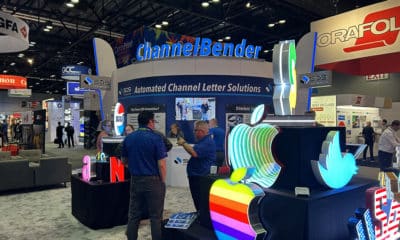
 Photo Gallery2 weeks ago
Photo Gallery2 weeks ago30 Snapshots of the 2024 ISA Sign Expo
-

 Paula Fargo1 week ago
Paula Fargo1 week ago5 Reasons to Sell a Sign Company Plus 6 Options
-

 Real Deal1 week ago
Real Deal1 week agoA Woman Sign Company Owner Confronts a Sexist Wholesaler
-

 Photo Gallery1 week ago
Photo Gallery1 week ago21 Larry Albright Plasma Globes, Crackle Tubes and More
-
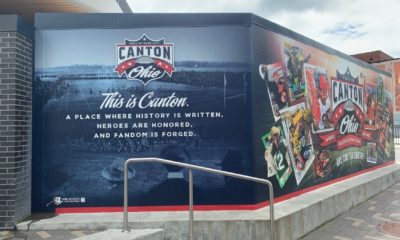
 Projects1 week ago
Projects1 week agoGraphics Turn an Eyesore Cooler Into a Showpiece Promo in Historic Plaza
-

 Women in Signs2 weeks ago
Women in Signs2 weeks ago2024 Women in Signs: Alicia Brothers
-
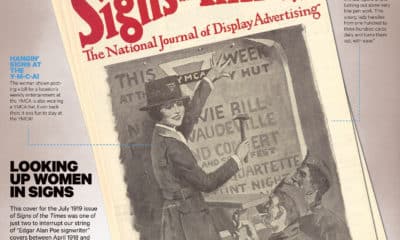
 Signs of the Times2 weeks ago
Signs of the Times2 weeks agoJuly 1919 Signs of the Times Cover Features Woman Installer
-

 Business Management6 days ago
Business Management6 days ago3 Things Print Pros Must Do to Build Stronger Relationships in the Interiors Market
